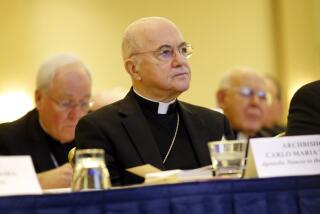Vatican Assails Murdoch Over Papal Articles
- Share via
VATICAN CITY — The Vatican expressed astonishment Tuesday that excerpts from the speeches and writings of Pope John Paul II are being presented in a new syndicated column as if they were articles written by the pontiff for profit. It said the excerpts are being presented in “a vulgarly impudent form.”
Msgr. Giulio Nicolini, deputy chief of the Vatican press office, issued a blistering written protest in response to reporters’ questions about the syndicated column. The first installment was published by many newspapers around the world last weekend.
The column--syndicated by newspaper magnate Rupert Murdoch’s organization--consists of excerpts from papal speeches and writings edited by Joseph Bloch, an American translator and scholar on Roman Catholic affairs.
The Vatican statement referred specifically to a column titled “On Apartheid,” which the Madrid daily newspaper ABC and other papers published Saturday.
The ABC column features a portrait of the Pope, and at the bottom of the column is the byline Juan Pablo II, the Spanish version of John Paul’s name. In tiny print at the bottom of the page is the copyright identification: The Times of London and News America Syndicate. Both organizations are now owned by Murdoch.
“I can only express astonishment and reprobation,” Nicolini said. “It is inadmissible that the name of the Holy Father should be used as a journalistic signature and involved in commercial operations.”
The statement said everyone has freedom of access to published papal speeches and writing. “But the exercise of such freedom carries with it the obligation to give accurate citation of the sources so that every concept (expressed by the Pope) can be read in its exact textual and contextual significance and the reader is given a means of verifying its authenticity. . . .”
On July 7 and Sept. 4, the Vatican press office issued statements on the impending start of the Murdoch syndicated column. They stressed that the Pope would never publish articles in the press, but that there was no objection to publishing excerpts.










